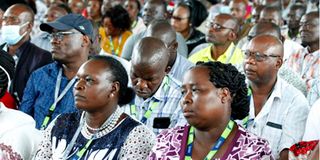Why school heads should be accountable to the ministry

Headteachers during the 45th Kenya Secondary School Heads Association annual delegates conference in Mombasa.
Before the Teachers Service Commission (TSC) became a constitutional commission in 2010, it used to appoint provisional education officers (PEOs) and district education officers (DEOs) as its agents for teacher management. This agency could be withdrawn if the TSC was not satisfied with one’s performance and the Education ministry would have to reassign duties to the affected officer that do not involve teacher management.
During my tenure as Secretary of TSC, I did so to a DEO—much to the consternation of the ministry as that had never happened before. But that got the agents to work well.
The Presidential Working Party on Education Reform (PWPER) has recommended that the ministry appoint heads of basic education institutions as its agents. It argued that the principal secretary in charge of Basic Education does not have control over appointment, deployment and discipline of head teachers and yet they manage their schools on behalf of the ministry.
Though akin to the previous TSC agency, that raises a number of issues. First, teachers in general and head teachers in particular have been socialised to have a lot of respect or reverence for a ministry’s officer—such as quality assurance officers, who visit schools from time to time, or auditors. Even in 1990-2003 in primary schools and 1990-2008 in secondary schools when the ministry never provided any capitation to them, head teachers dutifully respected ministry officials. The allegation that teachers are only respectful to TSC officials is, thus, not true.
Examination irregularities
Secondly, any adverse quality assurance report from the ministry dispatched to TSC would be acted upon immediately—and school heads know it very well. An example is when several principals were implicated in the KCSE examination irregularities in 2002. The ministry provided the evidence and TSC interdicted them immediately. A PEO was also interdicted and later retired for it.
The third issue is the role of the audit department of the ministry. Procedurally, any adverse audit report would be submitted to TSC with the necessary recommendations of action points. TSC would immediately interdict the school heads involved and invite the auditor to the discipline panel to prosecute the case. A representative of the head of professional services in the ministry would also participate in the process. PWPER’s allegation that the ministry does not participate in it is uninformed.
Fourthly, the appointment, deployment and promotion of head teachers go hand in hand. There used to be a provision for the promotion of teachers on merit that was within the ambit of the ministry. Whereas well-performing teachers were identified and promoted, there were others who had discipline cases at TSC but were still promoted by the ministry. TSC, though the teachers’ employer, had no role in these promotions.
The task force did not explain why the existing system has failed to warrant the changes it has recommended. These matters must be evaluated and a seamless structure and procedure developed lest the challenges of the past were revived through procedures that provide for loopholes and disharmony.
Mr Sogomo, an education exert, is a former Secretary of TSC. [email protected]. @BSOGOMO





